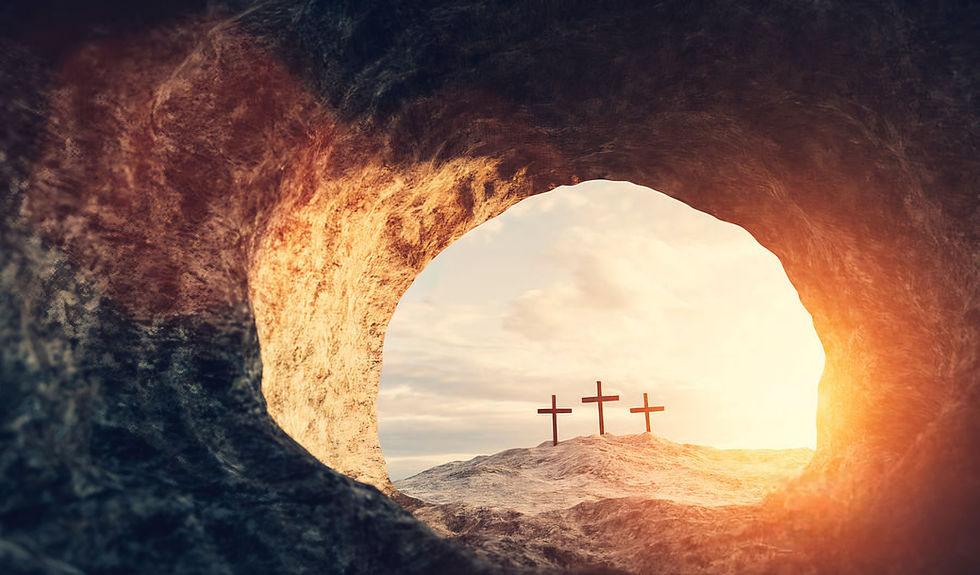A Living Faith
- Crossfire

- Dec 3, 2023
- 6 min read

God created Adam and Eve. He provided everything for them. A garden filled with delicious fruit and gorgeous beauty. Yet, He gave them one stipulation, “do not eat of the fruit of the tree in the center of the garden, lest you shall surely die”. All the rest was theirs to enjoy and savor. Yet upon hearing the words of the crafty serpent, their hearts began to distrust the words of God. They began to see the fruit of the forbidden tree as the most desirable of all the fruit and therefore the most delicious. Their hearts began to change. Suddenly, God was no longer a God of abundant provision but rather a stingy god that withheld the best for himself. Surely, what their eyes could see was much more believable than the mere words that God had spoken. Words were just words but the fruit that they could hold in their hands, that was reality.
The created ones chose to believe in what their senses perceived as reality instead of relying on the truth spoken and shown by their Creator. Their faith was placed upon a twisted version of truth that appealed to their heart. They turned away from Him and instead chose to follow their own path.
In that moment, the created walked away from the Creator. And from that point on, Eden was lost and the intimate relationship was broken.
“Therefore the Lord God sent him out from the garden of Eden to work the ground from which he was taken. He drove out the man, and at the east of the Garden of Eden he placed the cherubim and a flaming sword that turned every way to guard the way to the tree of life.” Genesis 3:23-24
Fortunately for us, God was not okay with the new state of the relationship. He fiercely loved His creation and continually pursued their hearts in order to woo them back (Hosea 2:14). Much of the Old Testament is filled with beautiful words and promises from God that He will provide a way that will restore what was broken. The intimate relationship between God and man will once again be reinstated.
In Genesis 15, God makes covenants with Abraham. This action on God’s part guarantees that though man may be unfaithful towards God, God will never break His covenant. He will always seek men's and women’s hearts. He will always keep His promise.
The Old Testament is full of accounts of real life people sometimes succeeding in their walk with the Lord, but more often than not, we see them following the way of Adam. Choosing to rely on themselves and their own strength and understanding. God continually pursuing them and the people continually pursuing other things: “But the more I called to him, the farther he moved from me” (Hosea 11:2).
At the end of the Old Testament, God seems to have had enough of the people’s rebellion and rejection. For 400 years God was silent. No prophets of God call out to the people.
“The time is surely coming,” says the Sovereign LORD, “when I will send a famine on the land— not a famine of bread or water but of hearing the words of the LORD. Amos 8:11
Then, the silence was broken as God kept His promise. He sent the Messiah to provide the way of reconciliation between Him and all of His creation.
And now we find ourselves entering the Advent season. The passages of Matthew and Luke are fairly well known and often recited at this time of year. We know how the angel came to Zachariah, Elizabeth, Mary and Joseph to tell them of wonderful things. We read how they each responded, and we rejoice that they were faithful to follow God’s plan.
For Zachariah and Elizabeth, the angel’s words were like salve to heal the long time wound of barrenness. But for Mary and Joseph, while the words may have been wonderful to hear, the days and months following the pronouncement had to be full of fear and anxiety. It would be easy to romanticize the story. Imagine how magnificent it would be to be chosen to carry the baby Jesus and be His mother. But what Mary and Joseph likely endured was not a carefree time. They would have to walk through the streets of their town knowing the judgment of those they passed. Hearing the whispers and the stigma attached to their names. For Mary, being found unmarried and pregnant, could have meant expulsion from society or even death by stoning.
How did this young teenage girl come to recite the words recorded in Luke 1:38, “I am the Lord’s servant. May everything you have said about me come true.”? Where did faith and trust like this come from?
We are given the answer in her song, often called the Magnificat:
“For the Mighty One is holy, and He has done great things for me. He shows mercy from generation to generation to all who fear him.”
“He has helped his servant Israel and remembered to be merciful. For He made this promise to our ancestors, to Abraham and his children forever.” (Luke 1:49-50, 54-55)
Here we see that Mary knew the Old Testament Scriptures and the promises of God. Her knowledge of His covenant promises gave her the faith to trust in the words of the Angel. She had heard all her life of the promised Messiah and all that God had done for His people. Her faith in God was based on her knowledge of His steadfast love and commitment. He had always kept His promises. Generational testimonies of God’s unfailing love provided a firm foundation for Mary’s faith.
In the interchange with the Angel, Mary asks a question. She is curious to understand how these promises will be accomplished. She is not admonished for her question, but instead, the Angel basically gives Mary a way of finding confirmation. He tells her about Elizabeth’s pregnancy and says in Luke 1:37, “nothing is impossible with God”. Mary then goes to see Elizabeth, who confirms God’s amazing miracles that each of them are carrying.
Mary heard the angel, questioned the method, verified the answer, and then acted in faith to follow God’s plan. Joseph acted in faith as well as he believed the vision of the angel and the words spoken to him. They both were able to act in faith because they both knew the words of the Scriptures and they knew the history of God always doing exactly what he promised. His words were trustworthy and believable because He always did as He said He would.
God showed His constant and consistent faithfulness in sending Jesus. Mary and Joseph showed their faith because they took Him at His word and trusted He would make a way. As always, God would provide the means for them to fulfill His will.
Normally, Advent season draws my heart and mind to dwell on the fulfillment of God’s plans through the birth of Jesus. I think of God’s faithfulness and His love towards us. But I am not sure if I have ever before pondered this much on the connection between my own faith and the incarnation. The nativity scene is a sweet story that warms our hearts and comforts us, but it is so much more than that. It is the moment that all of the faith and hope of the Old Testament prophets was realized. God’s Messiah was here. Immanuel came for us and because of that I can know, without a doubt, that God is worth believing in and placing my trust upon.
The Message translates Hebrews 11:1 this way:
The fundamental fact of existence is that this trust in God, this faith, is the firm foundation under everything that makes life worth living. It’s our handle on what we can’t see. The act of faith is what distinguished our ancestors, set them above the crowd.
It is not a faith that makes the untrue true or a mere mental assent towards an ideology. Our faith grows as we walk through life surrendered to God. It is hard to define the word “faith" without using words like trust, belief, obedience and steadfastness. All of these words in themselves are hard to define and completely understand. Yet, somehow, the faith we are called to have is all of these combined. Faith is given to us through the grace of God as we grow and seek Him. It is a living faith that deepens and widens as we seek Him.
Consequently, faith comes by hearing, and hearing by the word of Christ. Romans 10:17
From the beginning of Genesis, He has always acted in accord with His character and always in pursuit of His creation. He chose to be love to us. He did not walk away from us, yet He provided the means of reconciliation with humanity through Jesus’ birth, death and resurrection.
In this season, may we be like Mary and ponder deeply on these things of God and treasure them up in our hearts (Luke 2:19).



Comments